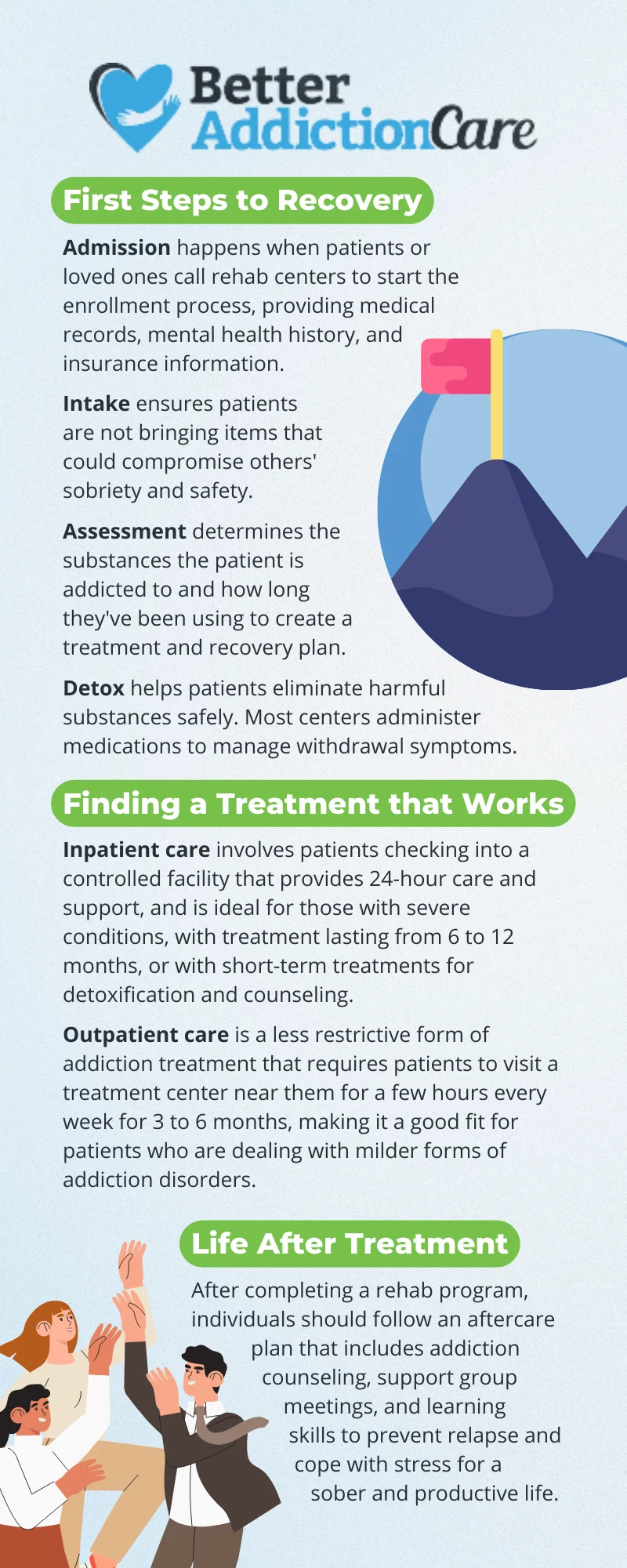Strategies for a Successful Addiction Treatment

Addiction is still a major problem that people all over the world have to deal with, even nowadays. No one is immune to the devastating effects of addiction since it has the power to destroy lives, both for the addicts and those around them, such as their friends, families, and communities. Whether it is an addiction to video games, gambling, drugs, or any other kind of obsessive and anxious behavior, the existence and increased levels of addiction rates in society are undeniable.
Different approaches to treating addiction could be taken. However, they all require a strategy that includes medical, psychological, social, and even spiritual treatments. Having an ideal treatment means having a holistic approach that could include everything necessary for treating each specific case of substance abuse.
This essay will expose the different types of addiction treatment, reveal the potential obstacles, and explain the recent scientific developments in the fight against this societal problem.
Understanding Addiction
The brain's reward and pleasure systems are altered over time with drug use, leading to addiction. These systems usually get hijacked by the alteration in neurotransmitters caused by different drugs, resulting in abusers seeking pleasure despite the negative consequences in their lives.
In general, it could be said that addiction is a chronic disorder that is usually fraught with relapses. This disease could impact anyone, regardless of race or culture, and it could include drugs like nicotine, alcohol, and opioids, among others, that are capable of causing severe health problems.
What are the Different Treatment Approaches?
There are many approaches to addiction treatment; however, the goal of all should be to not only seek "a cure" for addiction but to reintegrate people who struggle with substance abuse. The decision of what type of treatment or how many therapies will be integrated into a treatment varies according to the patient, the type of addiction, and the severity. Depending on this, the first choice will be between inpatient or outpatient treatment, with sobriety as the main rule and the search for the source of the problem.
It is important to note that although therapy may start with a detox, the reality is that the real journey begins after rehabilitation due to the high risk of relapse. Sobering treatments such as sober living houses, outpatient treatment, and participation in meetings (such as AA or NA) are essential in many cases. All addiction treatments address in some way the complicated biological, psychological, social, and environmental aspects that cause addiction. Addiction treatment teaches coping skills, desire management, and behavior modification for long-term recovery and well-being.
What is a Comprehensive Treatment Program?
The main goals of a comprehensive treatment program are the addict's rehabilitation and treatment through an integrated process that considers a variety of components that affect the addict's life, including biological, psychological, social, and environmental aspects.
It is essential to emphasize that the main goal of comprehensive programs, besides sobriety, should be the integration of the individual into a typical living environment with their friends and family. Different levels of care are part of this type of program.
Which Are the Behavioral Therapies?
Behavioral therapies are a fundamental part of treating various mental illnesses and addictive behaviors. Some of these therapies include the following:
Cognitive-behavioral Therapy (CBT)
This type of therapy is designed to equip people with positive reinforcement-based thinking. The foundation of Cognitive Behavioral Therapy is to teach people to recognize distorted and/or dysfunctional thought patterns and their manifestation in erratic actions, such as addictive behaviors, to be able to change them.
Contingency Management
This type of therapy could be used for a limited time since it focuses on reinforcement to promote abstinence and good behavior in patients. It gives incentives or rewards each time the objectives are met, but the need for rewards could increase each time.
Motivational Interviewing (MI)
Motivational Interviewing addresses change ambivalence in a patient-centered, direct manner. Empathic listening, introspective questioning, and collaborative goal planning help people explore their motives, values, and goals and find gaps between their current behavior and desired outcomes.

Is it Good to Use Pharmacotherapy?
Substance abuse treatment (SUDs) often requires the use of pharmacotherapy, a form of evidence-based therapy called medication-assisted treatment (MAT), which aims to address the neurological systems affected by substance abuse.
Opioid Use Disorder (OUD)
Opioid use disorder is one of the most severe public health issues. Pharmacotherapies available for treating OUD are:
- Methadone
Methadone is a long-acting opioid agonist that helps people with opioid use disorder (OUD) by reducing cravings and withdrawal symptoms.
- Buprenorphine:
Buprenorphine is a partial agonist of opioid receptors. It causes a decrease in cravings and withdrawals to a certain degree.
- Naltrexone:
Naltrexone has opioid antagonist properties that decrease the reinforcement feeling caused by opioids, and it also helps in relapse prevention.
Alcohol Use Disorder (AUD)
Alcohol Use Disorder is defined by symptoms of craving, impulse-control problems, and harmful use of alcohol despite undesirable consequences. Pharmacotherapy options for AUD include:
- Acamprosate:
It not only reduces the craving for the substance but also helps to keep the patients who have AUD to stay sober.
- Disulfiram:
This therapeutic agent elicits dizziness and heaving when someone drinks alcohol. Aversion to drinking from disulfiram appears to be the cushion from this medication.
- Naltrexone:
It is usually used to address opioid use disorder. However, it can also be utilized as part of AUD therapy by reducing the rewarding effects of alcohol and also decreasing the brain's craving for alcohol.
Nicotine Dependence
One of the well-known addictions that arise from tobacco consumption is nicotine dependence. Pharmacotherapy options for nicotine dependence include the following:
- Nicotine replacement therapies:
There is a range of items, from nicotine patches, gum, and lozenges to inhalers, that make people receive a nicotine dose without the irritating chemicals present in tobacco smoke and help them cope with the cravings and withdrawal symptoms during smoking cessation.
- Bupropion:
This medication does the dual task of being an antidepressant and also reduces withdrawal symptoms and cravings by regulating neurotransmitter activity in the brain.
- Varenicline:
It works by partially stimulating nicotine receptors while also blocking the effects of nicotine. The medication reduces the degree of reward that smoking gives, which, consequently, reduces the urge to smoke.
Challenges in Addiction Treatment
Despite significant improvements have been made in addiction treatment, numerous challenges continue:
Cost of Treatment:
Addiction treatment costs may depend on the type and location of a facility, the duration of treatment, the type of program, the facilities, and the need for medical detoxification or medications. Out-of-pocket costs can also be influenced by the type of insurance.
Stigma and Discrimination:
The stigma of addiction, in many instances, makes people shun treatment for fear of being judged and discriminated against.
Limited Access to Treatment:
Treatment alternatives for addiction vary according to the patient’s whereabouts, financial status, and healthcare provision. Many people miss timely and necessary care as the waiting lists are long, insurance coverage might be insufficient, and transportation could be inadequate. Most people do not have private insurance and are limited from going to private treatment centers; they have to wait up to 6 months to go to state-funded facilities.
Underfunding and Resource Constraints:
Addiction treatment programs are typically underfunded, thus making the services that they offer of poor quality and with little variety.
Co-occurring Disorders:
Addiction is frequently comorbid with other mental health conditions, including mood disorders, anxiety, and PTSD.
Relapse and Continued Use:
Relapse is a common term in the treatment of addiction, and it is frustrating. Many addicts are unable to remain sober when they are tempted and feel other negative emotions despite relapse prevention and ongoing support.
Progress in Addiction Treatment
Although addiction treatment poses a lot of challenges, significant progress has been made over the past few years, such as:
Evidence-Based Practices:
Focusing on strategies based on scientific research and clinical evidence has made addiction treatment more successful. MAT, harm reduction, and trauma-informed care are some of the therapies used for substance use disorders.
Advancements in Neuroscience:
Neuroscience advances have improved our knowledge about addiction as a brain disease and opened the door for new treatment methods aimed at certain neurobiological pathways.
Integration of Peer Support:
Peer support services are an essential part of addiction recovery; they include mutual aid groups such as Alcoholics Anonymous (AA) and Narcotics Anonymous (NA), which provide social support, accountability, and community.
Policy Reforms and Public Health Initiatives:
Reforms oriented at widening the availability of addiction treatment, decreasing stigma, and eliminating social determinants that impact health have led to better results for people suffering from substance abuse and their families.
Which Is the Appropriate Treatment?
Counseling, therapy, medication management, and advocacy are offered alternatives. Detoxification, therapy, medication-assisted treatment, and aftercare are available in treatment centers. Rehabilitation should be done in partnership with these specialists and programs. With our Treatment Center Finder, you can locate the perfect treatment option.



